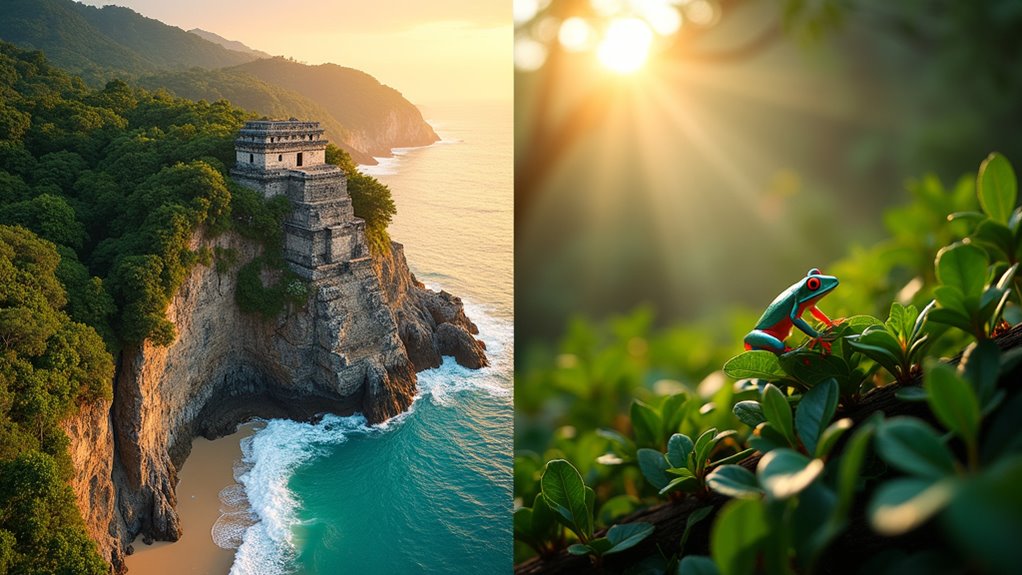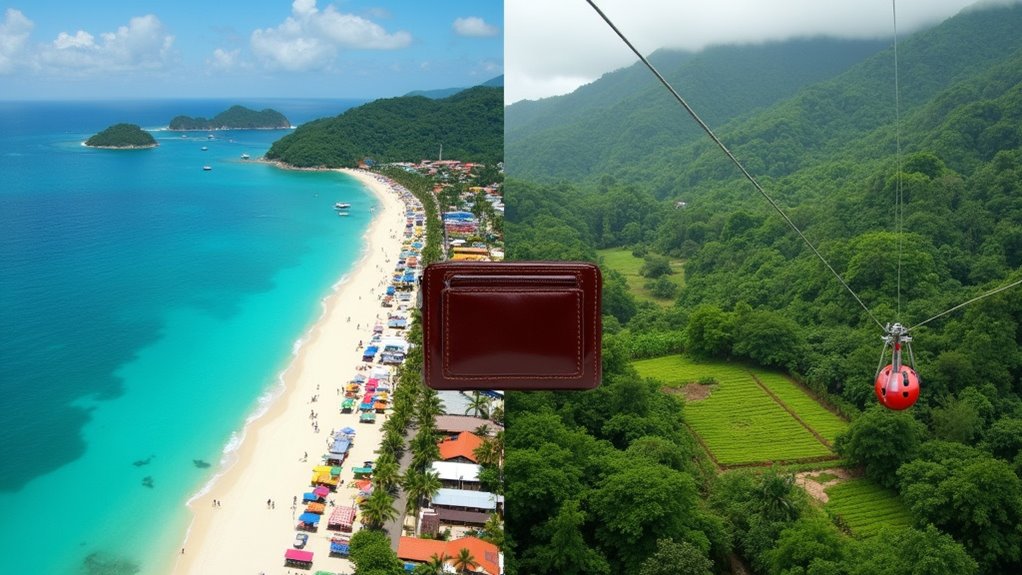Physical Address
304 North Cardinal St.
Dorchester Center, MA 02124
Physical Address
304 North Cardinal St.
Dorchester Center, MA 02124

Journey through tropical paradises as Mexico and Costa Rica compete for your vacation dreams—which destination truly deserves your escape?
Mexico offers better value with extensive infrastructure, diverse accommodations, and growing tourist numbers, while Costa Rica excels in eco-tourism with protected lands and world-class biodiversity. Mexico provides cultural experiences and budget options across varied regions, whereas Costa Rica delivers pristine nature and adventure activities despite recent tourism declines. Your ideal choice depends on priorities: Mexico’s affordability and amenities or Costa Rica’s environmental focus and sustainable travel experiences. Discover which tropical paradise aligns with your travel style.

While both Mexico and Costa Rica have long been tropical favorites, recent data reveals starkly diverging tourism trajectories.
Mexico’s tourism sector is booming with 3.8 million air arrivals in early 2025—up 2.7% year-over-year and 17.9% above pre-pandemic levels.
Meanwhile, Costa Rica faces a concerning 7% decline in February 2025 compared to the previous year.
You’ll find Mexico particularly attractive to North Americans, with U.S. arrivals 38.2% higher than 2019 levels.
Costa Rica’s struggling numbers stem largely from safety concerns, with over 6,300 tourist-related crimes reported in 2024-2025.
This security issue is driving visitors away despite the country’s earlier growth momentum.
Despite current challenges, Costa Rica still offers top holiday destinations that continue to attract adventurous travelers seeking natural beauty.
If you’re planning your next tropical getaway, these shifting patterns might influence your destination choice.
The strong Costa Rican colón has also contributed to tourism decline, forcing hotels in Guanacaste to raise prices by up to 15% to offset losses.
Although both destinations offer stunning tropical experiences, they present distinctly different safety profiles that travelers should carefully evaluate. Costa Rica generally provides more security as one of Central America’s safest countries, while Mexico’s safety varies dramatically by region.
You’ll encounter more petty theft in Costa Rica but considerably higher violent crime rates in Mexico. When visiting Costa Rica, travelers should exercise normal precautions while enjoying its renowned ecological attractions. When visiting either country, thoroughly research specific destinations—Mexico City and Cancun are typically safer than states like Guerrero or Tamaulipas. Mexico City has been consistently ranked among the World’s Safest Cities for several years according to Berkshire Hathaway Travel Protections.
For maximum security:
Remember that tourist areas in both countries maintain enhanced security measures, but staying vigilant is essential regardless of your destination.

When comparing Mexico and Costa Rica‘s natural attractions, you’ll discover two distinct ecological havens with their own environmental marvels. Costa Rica shines with its extraordinary biodiversity, protecting nearly 30% of its land through national parks like Manuel Antonio and Corcovado. You’ll find pristine beaches, lush rainforests, and the misty Monteverde Cloud Forest teeming with wildlife. Monteverde stands out as an eco-friendly paradise where visitors can experience Costa Rica’s dedication to conservation firsthand.
Mexico offers unique natural wonders including the cenotes of Yucatan and the marine-rich Sea of Cortez. While both countries feature mountains and beaches, Costa Rica’s focus on sustainability and eco-tourism creates a more immersive natural experience. Costa Rica’s beaches offer laid-back atmospheres perfect for relaxation and water activities like surfing and snorkeling.
You’ll enjoy more accessible hiking trails and adventure activities like ziplining in Costa Rica, whereas Mexico blends its natural attractions with nearby cultural landmarks like Tulum.
Considering Mexico and Costa Rica’s tourism infrastructure reveals significant differences that will impact your travel experience. Mexico offers superior air connectivity with multiple international hubs and extensive domestic flight networks, making it easier to reach diverse destinations.
You’ll find a wider range of accommodations at various price points, from budget stays to luxury resorts. Costa Rica compensates with exceptional surf lodges catering specifically to wave enthusiasts, especially along its Pacific coast. Mexico’s tourism sector has demonstrated remarkable strength with over 45 million international travelers in 2024, reflecting its robust infrastructure development.
Costa Rica’s infrastructure is more limited but purposefully so. While main tourist areas are well-served, reaching remote eco-lodges often requires additional travel time on rugged roads.
You’ll need 4×4 vehicles for many nature reserves, whereas Mexico’s highway systems and reliable bus networks make independent travel simpler.
Both countries offer English-speaking services in tourist areas, though Mexico’s larger destinations typically provide more all-encompassing visitor infrastructure, particularly for those seeking convenience alongside culture.

Understanding the economic impact of tourism reveals significant differences in value between Mexico and Costa Rica. While Costa Rica commands premium prices (over $1,000 per tourist) through its ecotourism focus, Mexico offers better overall value for budget-conscious travelers.
Costa Rica’s strong colón (₡510/USD) has driven up prices, forcing businesses to increase rates for accommodations and tours. This economic reality has created challenges during low seasons, as evidenced by declining numbers in 2024 despite record-breaking Q1 revenue of $1.78 billion. Travelers should be prepared for average travel costs that tend to be higher than many other Latin American destinations.
Mexico’s diverse tourism model provides more options across price points. You’ll find everything from luxury resorts to affordable hostels. Mexico welcomed approximately 22.3 million foreign travelers in 2011, generating significant economic benefits for the country.
While Costa Rica attracts eco-conscious travelers willing to pay more, Mexico’s higher visitor volume balances its lower per-capita spend.
Beyond the current value proposition, both Mexico and Costa Rica are shaping dramatically different futures for their tourism sectors.
Costa Rica is positioning itself as a global sustainability leader, hosting the 2025 Sustainable & Social Tourism Summit and projecting $2.04 billion in market growth by 2029.
When planning future trips, contemplate Costa Rica’s commitment to regenerative tourism—going beyond sustainability to actively restore ecosystems.
With 26% of land protected and ambitious carbon neutrality goals, your tourism dollars contribute to conservation.
Investment in eco-lodges, renewable energy projects, and community-based tourism creates authentic experiences while supporting local economies.
For surf enthusiasts, Costa Rica offers popular coastal destinations like Tamarindo and Nosara that combine sustainability with world-class surfing opportunities.
Though Costa Rica faces challenges balancing growth with conservation, their certification programs ensure your eco-friendly stay meets global standards—something to think about when booking your next tropical getaway.
Visitors to the 2025 Summit can expect keynote speeches from sustainability leaders and valuable networking opportunities with tourism operators, policymakers, and NGOs.
Whether you choose Mexico’s vibrant beaches or Costa Rica’s lush rainforests, your tropical escape awaits! Both destinations offer unique experiences at various price points. Consider your priorities—safety, accessibility, or eco-adventures—before booking. Like a skilled investor diversifying their portfolio, smart travelers balance their vacation wishes with practical considerations. Monitor travel advisories, compare off-season deals, and remember: the perfect getaway isn’t about the destination alone, but the memories you’ll create.